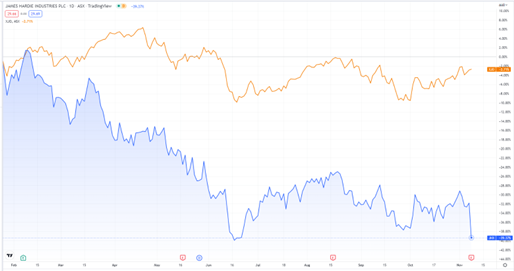Building products company James Hardie Industries [ASX:JHX] has downgraded its FY23 guidance and scrapped its dividend in a half-year trading update.
James Hardie noticed a ‘significant change to the outlook of housing market activity’ over the past 45 days. This rapidly changed outlook affects ‘most of the geographies’ where the business operates.
JHX has therefore seen fit to revise its FY23 guidance.
The updated FY23 Adjusted Net Income guidance range is now US$650–$710 million, changed from US$730–780 million, ‘due to a decline in volume expectations’.
JHX shares were down more than 10% late on Tuesday.
Year to date, JHX shares are down 50%.

Source: Trading View
James Hardie adjusts outlook in half-year trading update
The fibre, plaster, and cladding supplier did say that its profit after tax rose by 22% in the half year ending September 2022 — to US$271.5 million.
However, what appears to be really sticking out like a sore thumb is the adjusted net income guidance range decreasing to $US650–$730 million from US$730–780 million.
As a result, the adjusted EBIT margin also came down 0.7 points to 22.1% for the six-month period.
The building products firm explained this was a necessary measure when looking at volume expectations for the near future.
While inflation and interest rates have been a leading factor for some negative market trends, the housing market has significantly slackened, leading to European net sales dropping 2%.
But it wasn’t all bad news; as mentioned, post-tax profit rose 22%, and global net sales jumped 10% to a total of US$997.6 million over the second quarter.
Despite a sober outlook, adjusted net income gained 13%, with a total of US$175.8 million within the same three-month period.
The building company generated US$264.6 million operating cash flow in sales in the first half of the fiscal year 2023, in part offset by working capital increases (up US$46.9 million on increased inventory and lower payable accounts).
CEO Aaron Erter said:
‘Today we adjusted our Capital Allocation Framework to better match who we are: a growth company. The number one and primary focus of our Capital Allocation Framework is to invest in organic growth; our 5-year average Adjusted ROCE of 36% is proof that investing in our growth should be our number one use of capital.’
Erter remains optimistic:
‘This calendar year has seen the macro-economic environment continue to change around us quite significantly, with unprecedented levels of inflation, rapidly rising interest rates, slowing housing activity, global supply chain disruptions, and a war in Europe. At James Hardie, we are navigating this market uncertainty with a focus on controlling what we can control. We plan to win regardless of market conditions, and we will continue to accelerate and expand our competitive advantages.
‘Despite the reduction in our expectations for housing market activity, we are confident that we will be able to deliver growth above market and strong returns. This is reflected in the updated guidance provided today, which at its midpoint represents 10% growth in Adjusted Net Income versus the prior year.’
Top five retirement-worthy stocks
There has been a growing sense of unease in global markets.
Households and businesses have been squeezed as inflation continues to remain elevated.
Yet, some businesses can deal with inflation better than others.
Just look at the record cash generation by Santos and Whitehaven.
Our Editorial Director, Greg Canavan, has just released a research report profiling five steady stocks with strong cash generation.
Greg thinks these stocks have the potential to outperform in today’s volatile market and be ‘inflation busters’, despite the current bear market.
Regards,
Kiryll Prakapenka,
For The Daily Reckoning Australia

